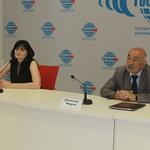The presence of a Georgian post near the Ossetian village of Uista (Tsnelis) is a constant factor of tension on the border of South Ossetia with Georgia.
As reported at the briefing in Tskhinval by the Presidential Plenipotentiary Envoy of the Republic of South Ossetia for post-conflict settlement Murat Dzhioev, the South Ossetian delegation announced this in Geneva.
“As we know, since August 2019, a rather tense situation has developed in the Uista area, when representatives of the Georgian Ministry of Internal Affairs, under cover of night, illegally set up a post in the immediate vicinity of a South Ossetian village. Over these almost two years, we have discussed the issue both at the IPRM meetings, as well as in Geneva. Unfortunately, it has not been removed from the agenda yet,” Dzhioev said.
According to him, the tension in one section of the border, naturally, is transmitted along the entire perimeter of the state border of South Ossetia with Georgia.
“We have stated that it is the detente of the situation in the village of Uista that is the key to creating a secure system along the entire perimeter of the border. Our position here is clear - the Georgian post is located on the territory of South Ossetia and it should be removed,” Dzhioev emphasized.
He has reminded that on the eve of the next round in Geneva, a delegation from among the co-chairs visited South Ossetia.
“We have invited them to visit the settlement of Uista, and they have seen how close the Georgian post is to it. Local residents very clearly expressed their concern about the situation, they talked about the danger of the shots fired there,” Dzhioev said.
The Plenipotentiary has noted that a few days later the OSCE representatives drove to this place by car from the direction of the Georgian village of Chorchana.
“They could see that the post is located at a great distance from the Georgian village, almost 4 km. This fact was noted during the last round of Geneva discussions,” he added.
Dzhioev has stressed that the OSCE representative noted in Geneva that this situation required an early resolution.






